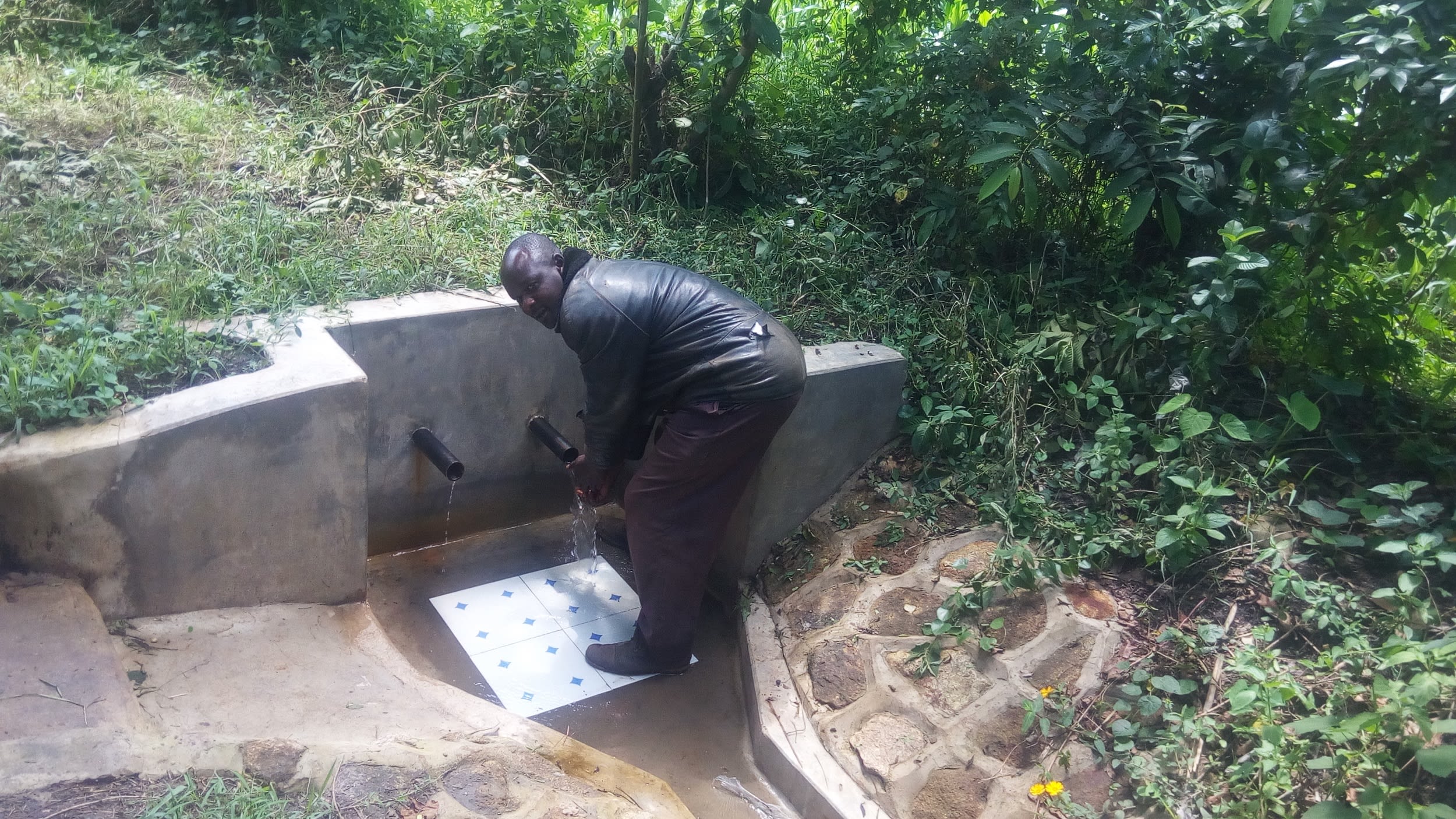This project is a part of our shared program with Western Water and Sanitation Forum (WEWASAFO). Our team is pleased to directly share the below report (edited for clarity, as needed).
Welcome to the Community
Arriving in Matsakha, one is met by heavy trucks taking the sugarcane harvested from the farms to Butali Sugar Factory. Many people within this community are sugarcane farmers, and their days start as early as 5am with sugarcane cutting. Women wake up even earlier than the men to prepare breakfast for them before they leave.
The women start streaming to the spring by 6am to fetch water for the rest of the day's cleaning and cooking. After preparing breakfast, women join their men on the sugarcane farms to cultivate and pick up the sugarcane behind the cutters. At the same time, children are seen carrying their school bags as they rush to school. Everyone starts arriving back home around 5pm. As they arrive, the women and children pick up their water containers and rush to the spring to fetch water for dinner and bathing. Young men are also seen on the path to the spring, taking their animals for watering.
Water Situation
Kombwa Spring is central to Matsakha Community, but its water is dirty. The community has been pulled along for years, with many politicians visiting and promising clean water if they're elected. Traces of local materials collected and delivered to the spring site were seen during our own visit, revealing this history of unfulfilled promises.
The nearest clean water source is Matasha Mwanje Spring, which is about 1.5 kilometers away. But community members don't always have that time, and must settle for the dirty water at home. This water is often used for drinking, cooking, and cleaning.
Mr. Kefa Manyasa said, "Am telling the greatest problem we face in this comunity is accessing safe and clean water. We have really been affected, especially our children who have had repeated cases of waterborne diaseases outbreak such as typhoid and diarrhea. I personally spent 3,500 shillings last month treating my younger son Jihn, age four. We shall really be grateful if we can get a sponsor!"
Sanitation Situation
Half of households in Matsakha have pit latrines. Most are made from mud in the traditional way, which makes them difficult to clean. These are also impossible to use during heavy rains that makes the dirt floor slippery. Half of them are currently posing danger to their users, with unstable floors and pits that are almost full. A small handful of latrines have concrete sanitation platforms like the ones we install, which are safest to use and easiest to clean. But the other half of families don't have access to a pit, and instead relieve themselves in the privacy of bushes. This waste is then spread around the community by flies, animals, and rainwater.
We saw a couple hand-washing stations during our visit to the community, but none of them had a cleaning agent like soap or ash. Though no hand-washing stations, many families have dish racks and clotheslines to help them safely dry belongings up off the ground.
Plans: Hygiene and Sanitation Training
Community members will attend hygiene and sanitation training for at least two days. This training will ensure participants are no longer ignorant about healthy practices and their importance. The facilitator plans to use PHAST (Participatory Hygiene and Sanitation Transformation), CLTS (Community-Led Total Sanitation), ABCD (Asset-Based Community Development), group discussions, handouts, and demonstrations at the spring.
Training will also result in the formation of a committee that will oversee operations and maintenance at the spring. They will enforce proper behavior around the spring and delegate tasks that will help preserve the site, such as building a fence and digging proper drainage.
Plans: Sanitation Platforms
On the final day of training, participants will select five families that should benefit from new latrine floors.
Training will also inform the community and selected families on what they need to contribute to make this project a success. They must mobilize locally available materials, such as bricks, clean sand, hardcore, and ballast. The five families must prepare by sinking a pit for the sanitation platforms to be placed over. All community members must work together to make sure that accommodations and food are always provided for the work teams.
Plans: Spring Protection
Construction will keep surface runoff and other contaminants out of the water, which means the water will be safe, clean, and adequate.
Fetching water is predominantly a female role, done by both women and young girls. Protecting the spring and offering training and support will therefore help empower the female members of the community by giving them more time and efforts to engage and invest in income-generating activities.

 Protected Spring
Protected Spring
 Rehabilitation Project
Rehabilitation Project







































